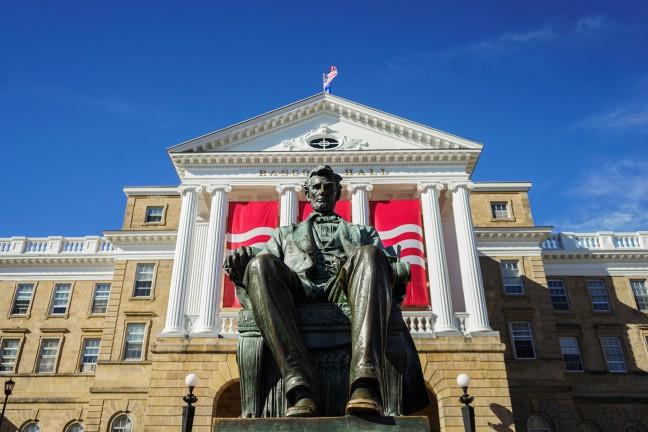Ten University of Wisconsin faculty members are being honored with the 2019 Distinguished Teaching Award, that recognizes the universities top faculty, according to a UW press release.
The awards recipients span many fields, including art history, nursing, journalism, law and psychology.
According to the Distinguished Teaching Award website, anyone is invited to submit nominations for the award regardless of a teacher’s rank or department. Sissel Schroeder, professor and chair of Anthropology at UW and co-chair of the Distinguished Teaching Awards committee explained in an email that after nominations are submitted, a committee of students, faculty and administrators score the nominees on a three-point scale and use composite scores to determine the winners.
“In the group of outstanding nominations, we look for professors who are passionate about their subject matter, clearly treat their students as individuals, put enormous and careful thought into their teaching, are original and innovative and can demonstrate that students are successful at learning in their classes,” Schroeder said in an email to The Badger Herald.
Steven Smith, secretary of the faculty at UW, explained in an email to The Herald the variation in awards. Some are intended for assistant or associate professors only, while one is for outreach-focused work, another for service-learning based work and one that focuses on diversity and inclusion. The committee is also currently exploring the possibility of adding an online or blending-learning award, he said.
Committee members are chosen from the pool of previous winners of the award and are appointed on a three-year basis, Smith said in his email.
For Michael Wagner, award recipient and associate professor of journalism and mass communication, the award struck an emotional chord. It was more than a testament to his teaching, it meant his work at UW made a positive effect on people’s lives.
“I put a lot of effort into my teaching, and I think about it a lot and I spend a lot of time working to help and develop and learn from my students, so it was really nice to hear that I got the award,” Wagner said.
Wagner talked about the development of his teaching throughout the years, saying his time at UW has made his standards for what he considers excellent has significantly increased, while his strictness on deadlines has decreased.
He also credits his time here to thinking more about diversity, including how to best help students that are different than him learn. Curiosity, Wagner said, is the key to finding how to best help those students succeed.
“It’s important to be curious about what’s going on with the students who don’t appear to be doing well in class,” Wagner said. “Is it that they have a unique problem that you can help with, or is it that they have a unique struggle where you can direct them to resources that will help them?”
Wagner also said he finds it important to give students easy ways to contact him so they feel comfortable. For this reason, Twitter has become a platform for him and his students to communicate better, he said.
Bianca Baldridge, award recipient and assistant professor of educational policy studies, also cited increasing creative technology in the classroom as something she has changed over her years of teaching.
“I’ve tried to be more thoughtful and intentional about assignments,” Baldridge said in an email to The Herald. “Instead of having students write a million pages, I’ve been asking students to be more creative in how they present what they know by using more creative platforms like film, technology, art/poetry, etc. I want students to be engaged and excited.”
For Baldridge, technology in the classroom allows students to be more engaged with the materials.
Anna Andrzejewski, award recipient and professor art history, also shared this opinion, as creative platforms allow students to write for larger audiences. He also believes the ability to respond to each student individually is one of the most important characteristics for a professor and has helped her to become a better teacher.
“Each student is different, and as a professor, I try to make sure that even if not every student likes me or my class, they at least know I see them as individuals and I’m trying to meet them in the best way I can,” Andrzejewski said in an email to The Herald.
To Patrick Remington, award recipient and professor of population health sciences, the most important aspect of teaching is to not forget what it’s like to be a student and to take student feedback in strides.
To do this, Remington said he continuously looks for changes to his teaching material and uses real-world examples. In his experience, this keeps students engaged.
“I teach courses in public health, and [the field] changes every day,” Remington said. “In fact, I gave a lesson [a few weeks ago] and I [had just heard] that eating cheese makes you live longer and I took that and used it to talk about in class that day.”
Wagner talked of the importance of the award to the teaching community at UW, saying the award confirms that although the university is known for their research, they equally value the teaching professors do here.
Schroeder also spoke on the importance of this award allowing the teaching staff to be honored for the hard work they do.
“The best professors are compassionate and treat their students like people … They are creative and thoughtfully integrate innovations into their classes,” Schroeder said. “The provide constructive feedback on student papers, assignments, and exams, using the feedback to help students understand their strengths and also their mistakes. The best teachers are often also the best scholars.”
Chancellor Rebecca Blank and Provost Sarah Mangelsdorf will present the awards to the ten winners April 10, in a ceremony open to the public.


